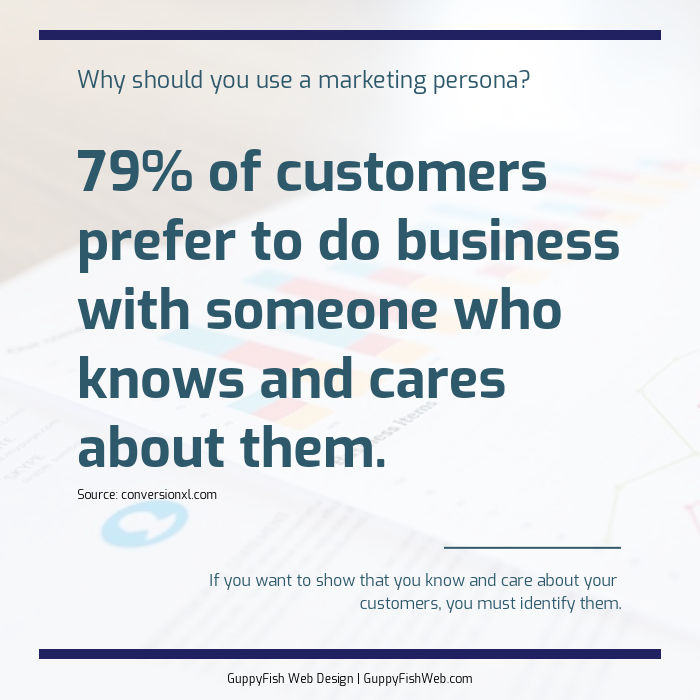Have you ever considered who is reading your content or visiting your website? We’ve talked before about website audiences, but let’s take that one step further. What do your ideal customers or supporters need? What are their heart’s desires? How do you get them to know that you’re the person for the job? The answer lies in your marketing persona.

Before we get into the “what” of a marketing persona, let’s talk about the “why”. Consider this: 79% of U.S. consumers are loyal buyers from brands that “understand and care about me.” If you know more about your customers and show that you care about them, you’re an awful lot more likely to see success with them.
What is a Marketing Persona?
A marketing persona is a document that outlines kind of a fictional character that you consider for any of your marketing efforts. Who is on the receiving end of your blog, website, or social media? What makes that person tick? Sometimes called a “buyer persona”, Hubspot identifies it like this:
A buyer persona is a semi-fictional representation of your ideal customer based on market research and real data about your existing customers.
The Definition of a Buyer Persona [in Under 100 Words]
In other words, your marketing persona represents your audience. You need to know what that person really needs and cares about before you try to market to him or her.
Identifying Your Customers
So what do you need to know about your persona? The short answer? Everything. I mean, you don’t need to know the names of their pets or the location of their birthmarks. That’s just creepy. Don’t be a stalker.

You do, however, need to know everything about this person as it relates to your business. Unsure where to get this info? The best place is right where you are. Take a good look at your existing customer base using as much data as you can find.
1. Demographics
Who is this person? Are you marketing more to males or females, younger or older, higher income or lower? Knowing the demographics of your user is the first step in identifying his or her needs. You should consider:
- Age
- Gender
- Marital Status
- Family Situation (single, married, kids)
- Job
- Income
- Hobbies/Interests
Remember, you’re trying to figure out who you want to reach. The way you market to single moms is going to be different than how you approach married executives with no kids. The more you can figure out about this person, the better you can target your marketing.
2. Personal Goals
Based on the demographics you identified, where is this person headed? Where does he/she want to be next in life? More importantly, what can you offer to help this person move closer to those goals? If you can answer this question, you’ve come a long way toward your marketing focus.
3. Business Goals
If you run a business that helps other businesses, then you want to identify what goals that type of organization or individual probably has. Just like with personal goals above, try to position yourself in a place that will show this person that you are the one who can help advance those goals.
4. Objections
You may be wondering about this one. Actually, I didn’t really understand it at first, either. I mean, what are they objecting to? This isn’t Law and Order.
When you look at it from a business perspective, however, it makes perfect sense. You need to identify the objections the person would have where it pertains to buying your product or services. When you don’t close the deal, why is that? Objections could pertain to any number of things. Is it the cost? Do they not have time for whatever you offer? Is there a size issue involved?
Once you’ve established the reasons people may object to doing business with you, now it’s time to think of answers to those objections. What can you tell this person that will help them realize that the cost is worth it, that they do have time, or that they have room for this item? Having answers ready ahead of time will put you ahead of the game when this person raises concerns.
Multiple Persona Disorder
Is it possible to have multiple personas? Absolutely!! If you have different products or services, they probably meet different needs! You can even give them names. Then you can cater your marketing to that particular persona. One campaign could target Suzy Shopper while another goes to David Downloader.
Now that you know why and how, get started on those marketing personas, and keep swimming along!




0 Comments